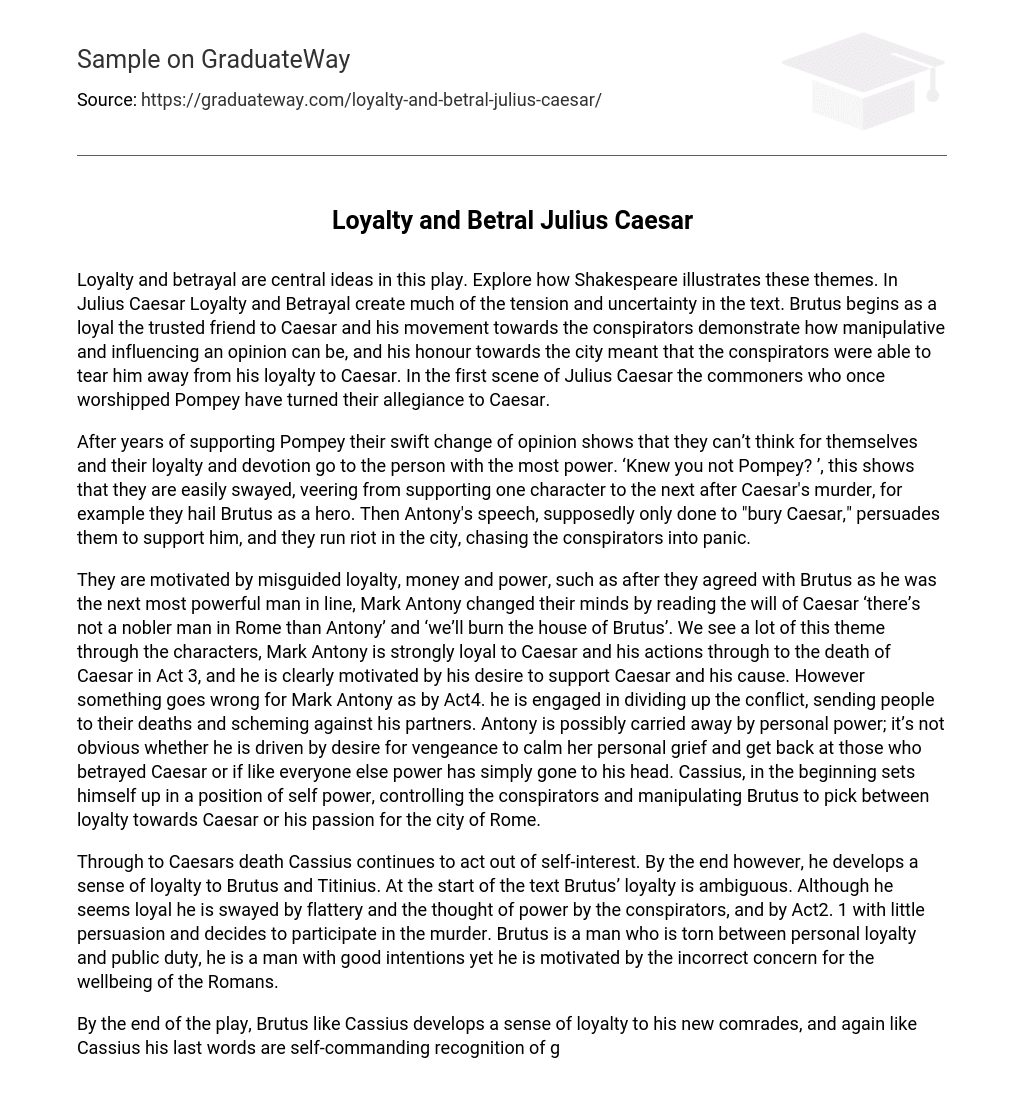In this play, Shakespeare focuses on the concepts of loyalty and betrayal. He explores these themes by depicting how they contribute to the tension and uncertainty in Julius Caesar. Initially, Brutus is portrayed as a loyal and trusted friend to Caesar. However, as the story progresses, his association with the conspirators reveals the manipulative and influential nature of opinions. The conspirators were able to exploit his sense of honor towards the city, which ultimately led to his betrayal of Caesar. Additionally, in the opening scene of Julius Caesar, Shakespeare highlights how the commoners, who previously worshipped Pompey, have now shifted their allegiance to Caesar.
After years of supporting Pompey, their swift change of opinion indicates that they lack independent thinking and their loyalty and devotion lie with the person who holds the most power. The phrase “Knew you not Pompey?” illustrates their susceptibility to influence as they switch their support from one character to another, such as hailing Brutus as a hero after Caesar’s assassination. Furthermore, Antony’s speech, supposedly intended only to “bury Caesar,” convinces them to rally behind him, causing chaos in the city as they chase the conspirators in a state of panic.
The characters in the play are motivated by various factors such as misguided loyalty, money, and power. For instance, they initially agree with Brutus because he is the next most powerful man in line. However, Mark Antony changes their minds by reading Caesar’s will, stating that there is no nobler man in Rome than Antony and expressing a desire to retaliate against Brutus. This theme is evident throughout the play. Mark Antony remains fiercely loyal to Caesar and acts accordingly until Caesar’s death in Act 3. However, in Act 4, Antony’s motivations seem to shift. He becomes involved in dividing the conflict, sending people to their deaths, and plotting against his partners. It is unclear whether Antony is driven by a desire for vengeance to ease his personal grief and betray those who betrayed Caesar or if he succumbs to the corrupting influence of power like everyone else. Similarly, Cassius initially positions himself as a figure of self-power, manipulating the conspirators and forcing Brutus to choose between loyalty to Caesar or his love for Rome.
From the beginning, Cassius is motivated by self-interest until Caesar’s death. However, towards the end, he develops loyalty towards Brutus and Titinius. At first, it is unclear where Brutus’ loyalty lies. Although he appears loyal, he is easily influenced by flattery and the allure of power from the conspirators. In Act 2, Scene 1, with little persuasion, he decides to join in the murder. Brutus struggles between his personal loyalty and his duty to the public. Despite having good intentions, he is misguided by his misplaced concern for the well-being of the Romans.
At the conclusion of the play, both Brutus and Cassius display newfound loyalty towards their fellow conspirators. They also express guilt and self-control in their final words. In Act 3.1, specifically, Brutus demonstrates betrayal. This portrayal emphasizes his weakness as a character and his lack of justification for assassinating Caesar, aside from his associates’ belief that Caesar was abusing power. As the last conspirator to stab him, Brutus evokes sadness and disappointment from Caesar with the famous line ‘Et tu, Brute? Then fall Caesar.’ This phrase reflects Caesar’s perception that Brutus, whom he considered a loyal friend, metaphorically betrayed him.
Caesar’s ego is shattered as he believes that if Brutus perceives him as a bad leader, then it must be true. “And then fall Caesar” – he seems to accept his impending death, for the people he trusted and believed to be loyal followers have betrayed him. Loyalty and betrayal are prevalent themes throughout the text, from start to finish. These themes are not only evident in the characters’ emotions and relationships, but also in the overarching Roman society. The characters’ actions heavily influence our perception of their loyalty or lack thereof.





